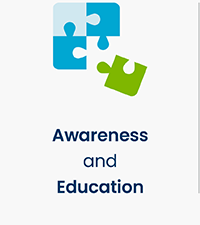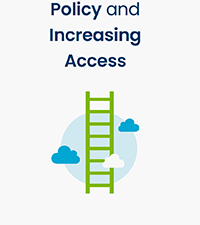The LUNGevity Early Lung Cancer Center (ELCC) is accelerating the development and broad adoption of early lung cancer detection, diagnosis, and treatment options with a clear vision of achieving a world where no one dies of lung cancer.
Today, only 22% of people are diagnosed at stage I or II, when the disease is most treatable—and often curable. Routinely diagnosing and treating lung cancer in its earliest stages should be the norm, not the exception.
The Early Lung Cancer Center is building on LUNGevity’s leadership in research, policy, partnerships, and education for early lung cancer. Coordinating internal and external initiatives to leverage promising opportunities across the spectrum of detection, diagnosis, and treatment will lead to stage-shifting this disease—resulting in better outcomes for patients.
There are more treatment options than ever for people with early-stage lung cancer, and additional therapies are on the horizon. It’s imperative that we increase detection and diagnosis rates to ensure that all patients can access and benefit from these scientific advancements.
How Is the LUNGevity Early Lung Cancer Center Doing This?
The Early Lung Cancer Center builds on existing expertise and programs at LUNGevity while pursuing new opportunities and partnerships that have the potential to expand our impact. It is dedicated to addressing key areas related to:
- Driving up lung cancer screening rates and adherence
- Instituting and standardizing incidental nodule programs
- Paving the way for new blood-based detection
- Ensuring that all people diagnosed with lung cancer have access to comprehensive biomarker testing to determine eligibility for treatment options and clinical trials
Since 2017, LUNGevity and the American Lung Association have partnered on the Lung Cancer Interception Team to move research from bench to bedside more quickly and benefit patients sooner. The team is focused on intercepting lung cancer—catching precancerous cells and blocking them from turning into cancer cells.
This partnership was recently renewed with a joint investment of $3 million into early lung cancer research through 2026.

This project represents an evolution of our ongoing efforts to understand and intercept lung cancer before it progresses. By unraveling the molecular and immune mechanisms underlying lung cancer development, we can develop targeted strategies for early detection and intervention.
—Avrum Spira, MD, Lung Cancer Interception Team Leader
Significant projects like this drive innovative research forward and are one of many ways the Early Lung Cancer Center is turning strategy into action. As we move forward with our partners, and join forces with new collaborators, we will continue to identify and act on priority areas where we can have the greatest impact.
LUNGevity's Work in Early Detection, Diagnosis, and Treatment

Research
LUNGevity has been investing in early lung cancer research since 2009, and that research is yielding results—most recently with the creation of a Pre-Cancer Genome Atlas to understand the genesis of lung cancer at its earliest stages. Research grants are delivering exciting progress for early detection projects aimed at:
- Creating a blood-based detection test
- Leveraging genetics to understand why younger adults are developing lung cancer
- Creating a best practices roadmap for lung cancer screening implementation
These efforts are complemented by research studies on attitudes of patients with early-stage lung cancer toward risks and benefits of treatments through the LUNGevity Patient-Focused Research Center, Patient FoRCe.
Awareness and Education
Rapid advances in detection, diagnosis, and treatment options can make it difficult for patients and medical professionals to be sure of the right path forward. LUNGevity is committed to making sure that patients and healthcare providers have access to needed resources and information through ongoing initiatives that include:
- Partnering with health centers and leveraging their community relationships to spread information about screening and early detection
- Collaborating with medical centers across the country to develop a standard incidental nodule follow-through procedure
- Educating current patients about treatment breakthroughs and medication approvals so they always have the most up-to-date information
- Raising awareness of comprehensive biomarker testing
Policy and Increasing Access
Collaborating with patient advocacy organizations, policymakers, and the over 3,000 lung cancer advocates in the LUNGevity Action Network allows us to work as a community to advocate for legislative policies that remove barriers to screening, early detection, and treatments.
Increasing access and making sure all people can benefit from lifesaving scientific advances influences the policy work and actions we have taken in recent years, such as:
- Signing the Lung Cancer Screening Consensus Statement
- Supporting the Increasing Access to Lung Cancer Screening Act
- Contributing to State-Based Insurance Reform
- Increasing Federal Lung Cancer Research Funding
LUNGevity’s Early Lung Cancer Center coordinates all of these activities across the Foundation and the lung cancer ecosystem to ensure that advances in technology and therapeutics are accessible to people who need it, when they need it.





